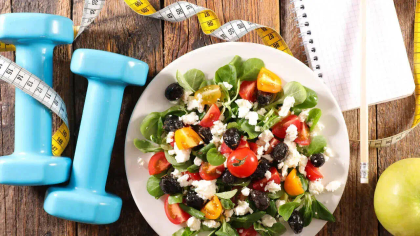"What’s the healthiest diet?”
This is one of the most commonly asked questions - and it's a difficult one:
There's countless different expert opinions, and different diets that are all promised to be the best - be it Keto, Vegan, Carnivore.
As a result, most people get confused, to the point where they’re unable to take consistent action.
In reality, this way of thinking misses the point.
In this newsletter, we are going to look at 4 aspects of the healthiest foods in the world, and how you can use them.
Keep reading to learn how to optimize your diet for greater fitness and enjoyment.
The ingredients that make foods healthy
Disclaimer: This article is not to be taken as nutritional counseling or health advice. You are responsible for the results of applying this content. The core ideas from this article stem from the book "The 150 healthiest foods on earth" by Jonny Bowden. The article is not a replacement for the book itself. I highly recommend you to read the book in its entirety. You can find it here (not an affiliate link).
Let's destroy a common myth:
There’s no popularized diet that can automatically be considered the “healthiest”.
Let's take the Keto diet as an example:
In this diet, the key is limiting carbs to maintain ketosis - as low as 50 grams or less.
But there are several different ways to accomplish that:
You could achieve that goal, eating nothing but bacon.
Or, you could eat wild-caught salmon, leafy green vegetables, grass-fed beef and eggs.
The same goes for other diets as well:
You could eat vegetarian through chocolate cookies.
Or, through a variety of fruits, vegetables, legumes, eggs and organic dairy products.
You could eat carnivore through hot-dog sausages.
Or, you could eat grass-fed beef, poultry and a variety of fish.
The flexible diet or "If-it-fits-your-macros" could be done by eating pasta and burgers.
Or, by eating large quantities of fruit, legumes, vegetables, meats and the occasional treat.
Instead, we need to take a closer look at the factors that make individual foods healthy.
Jonny Bowden, author of the book "150 healthiest foods on earth", describes 4 ingredients:
1) Omega-3 acids
Omega-3 acids, improve heart health, lower inflammation, and improve brain function.
They’re mainly found in fatty fish, some meats and some vegetables.
It's essential to have a proper balance of Omega-6 and Omega-3 acids in fats.
According to Jonny Bowden, this ratio lies between 1:1 and 5:1.
In modern diets, most people consume far more Omega-6 acids compared to Omega-3s (10:1 up to 50:1!).
2) Antioxidants
Antioxidants protect our cells from damage caused by harmful molecules.
This helps in reducing the risk of certain diseases and slows down aging.
You can find antioxidants in a variety of foods, mainly in fruits and vegetables.
Berries, nuts, dark chocolate, and green leafy vegetables like spinach are rich in antioxidants.
3) Fiber
Fiber is essential for maintaining a healthy digestive system.
It aids in digestion, helps maintain bowel health, and supports weight management.
Fiber also lowers the risk of heart disease, diabetes, and certain types of cancer.
Some great sources for fiber include oats, vegetables like broccoli, fruits, legumes and nuts.
4) Low glycemic load
Low glycemic load foods slowly release sugar, keeping energy steady and blood sugar balanced.
They help control weight by making you feel full longer and are good for heart health.
These foods are great for people with diabetes because they manage blood sugar well.
They include whole grains, legumes, nuts, seeds, most fruits, and non-starchy vegetables.
Practical takeaways
Here are some takeaways that will help you improve the quality of your diet:
There's no single "best food"
In contrast to animals, the requirements of a healthy human diet are complex:
They include protein, a variety of different fats and hundreds of different minerals and vitamins.
While some foods are packed with nutrients compared to others, there's no single one that covers them all.
The quality of food matters
“The quality of the food we eat comes from the quality of the food our food eats.”
You might think that eggs are eggs, apples are apples and beef is beef - but this is not true.
For example, grass-fed beef has up to 3 times as much Omega-3 acids as grain-fed beef!
Similarly, plants raised on higher quality soil will contain more nutrients
Eat less processed foods
Less processed foods are nutrient-rich and low in additives.
They have less salt, sugar, and bad fats, lowering chronic disease risk.
Their fiber improves digestion and helps control weight by keeping you fuller with fewer calories.
Here's a quote from Jonny Bowden:
"Eat real food. Stuff your grandmother would have recognized as food. Stuff that usually doesn’t come in a package. What you eat probably doesn’t ultimately matter as much as how much processing it’s undergone."
Eat more fruit and vegetables
According to Jonny Bowden, there are no bad fruits and no bad vegetables (unless you count fries).
Despite the trend of demonizing vegetables, science disagrees.
Fruits and veggies are high in antioxidants and fiber.
They help you feel full longer, which is great for losing weight.
Here’s a framework to optimize your eating habits:
1) Keep a diet journal
The first step of any sustainable change is awareness.
For a week, journal the meals you eat (no need to count calories - just write down what foods you ate each day).
2) Mark your favorites
Here are some of the "stars" of the 150 healthiest foods on earth:
Vegetables:
Beets
Broccoli
Brussels Sprouts
Cabbage
Carrots
Dandelion
Maca
Mushrooms
Onions
Spinach
Swiss Chard
Watercress
Grains:
Oatmeal
Quinoa
Beans and Legumes:
Beans
Lentils
Fruit:
Avocados
Blueberries
Raspberries
Strawberries
Cherries
Coconut
Guava
Kiwifruit
Nuts and seeds:
Almonds/almond butter
Pecans
Walnuts
Dairy:
Butter/Ghee (from grass-fed organically raised cows)
Milk (raw organic unpasteurized unhomogenized)
Natural Yogurt (kefir, lassi, Bulgarian yogurt live and active cultures, grass-fed)
Meat, Poultry, Eggs:
Eggs (free-range, organic)
Beef (grass-fed)
Poultry (free-range, organic)
Fish & sea-food:
Sardines (in sardine oil or olive oil - NOT VEGETABLE OILS!)
WILD-CAUGHT Alaskan salmon
Specialty foods:
Bee pollen, propolis, and royal jelly
Green foods and drinks (cereal grasses - barley grass, wheat grass; and microalgae - spirulina, chlorella, wild blue-green algae)
Kimchi (Chinese cabbage)
Sauerkraut (non pasteurized)
Sea vegetables/seaweed
Sprouts
Whey protein powder
Beverages:
FRESH vegetable (and fruit) juice
Noni juice
Pomegranate juice
Tea (green, black, white)
WATER
Herbs, spices, condiments:
Cinnamon
Garlic
Ginger
Oregano
Turmeric
Oils:
Extra-virgin olive oil
Flaxseed oil
Red palm oil (Malaysian)
Mark some of which you enjoy eating the most. - this is vital for sustainability.
Include them in your diet.
3) Iterate along the way
Optimizing your diet isn't a "once and done" kind of thing.
Start by including some of the foods on this list that you actually enjoy.
Prioritize those foods and over time, you’ll steadily improve the quality of your eating habits.
If you're a driven entrepreneur or creator and looking to:
Efficiently manage stress for better health and productivity
Drop up to 20lbs in 90 days, without the diet-hamster-wheel
Reach your dream physique in just 2 hours per week
Click HERE for a free 30-minute strategy call where I'll show you exactly how it works.

